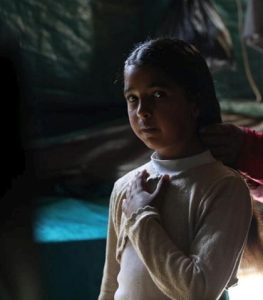Exiled Syrian refugees face poverty, food shortages
Syrians refugees exiled in camps in Iraq and Lebanon and elsewhere in the Middle East are struggling to survive as a global economic crisis emerges alongside food shortages driven by the war in Ukraine.
Iraq hosts nearly 260,000 Syrian refugees, the vast majority of whom are based in the Kurdistan Region.
 This includes 95,745 people who live in camps – 72,000 of whom receive vital food and cash assistance from the World Food Program (WFP) and the UN’s refugee agency UNHCR.
This includes 95,745 people who live in camps – 72,000 of whom receive vital food and cash assistance from the World Food Program (WFP) and the UN’s refugee agency UNHCR.
UNHCR says 86 per cent of refugees based in the camps, remain food insecure or vulnerable to food insecurity because of the economic shocks.
“The impacts of the COVID-19 pandemic on employment in 2020 and the consequent devaluation of the Iraqi dinar are still being felt while price rises caused by the war in Ukraine continue to reduce people’s access to basic food,” the agency said.
And families’ dependence on irregular and unpredictable cash jobs in the informal economy is a key aggravator of food insecurity.
UNHCR says that when opportunities to earn cash dry up, families are pushed into “negative coping strategies”, such as buying food on credit, reducing expenditure on basic needs, selling assets, child labour, or having children drop out of school so they can help bring in some money.
It says urgent additional funding is needed to continue assisting 72,000 vulnerable Syrian refugees in camps in Iraq, the agencies say.
The WFP requires $US10.1 million to continue uninterrupted monthly food and cash assistance.
“These are serious indicators that highlight the urgent need for supporting vulnerable Syrian refugees who are adversely affected by the current economic difficulties in Iraq”, a recent WFP statement said.
“WFP and UNHCR have supported Syrian refugees since the onset of the crisis and continue to do so, yet the rising food prices and reduced purchasing power of people’s income places them at greater risk of being food insecure.
“Without the requisite funds tens of thousands of people will suffer ever more severe levels of food insecurity,” the statement said.
Lebanon’s dire economic crisis – described by the World Bank as one the world’s worst national economic depressions – has had a devastating impact on the most vulnerable families in the country, including Syrian refugees.
With the Lebanese currency in freefall, and the war in Ukraine further exacerbating soaring prices and widespread shortages of food, fuel and medicine.
The situation is similar for many of the 5.7 million Syrian refugees currently living in Turkey, Lebanon, Jordan, Iraq, and Egypt, as well as the local communities hosting them.
Economic turmoil and the continuing aftershocks of the COVID-19 pandemic have pushed ever more families into poverty, creating unprecedented levels of hardship 11 years into Syria’s crisis.
Maintaining life-saving support for more than 20 million Syrian refugees and members of their host communities was the focus of an international donor conference on the future of Syria and the region on in Brussels last month.
The conference heard money is running out to help these families with basic day to day items, and with worsening economic conditions, refugees from the decade long conflict across Syria are often ‘drowning; in debt, they have no way or repaying, the UNHCR says.












